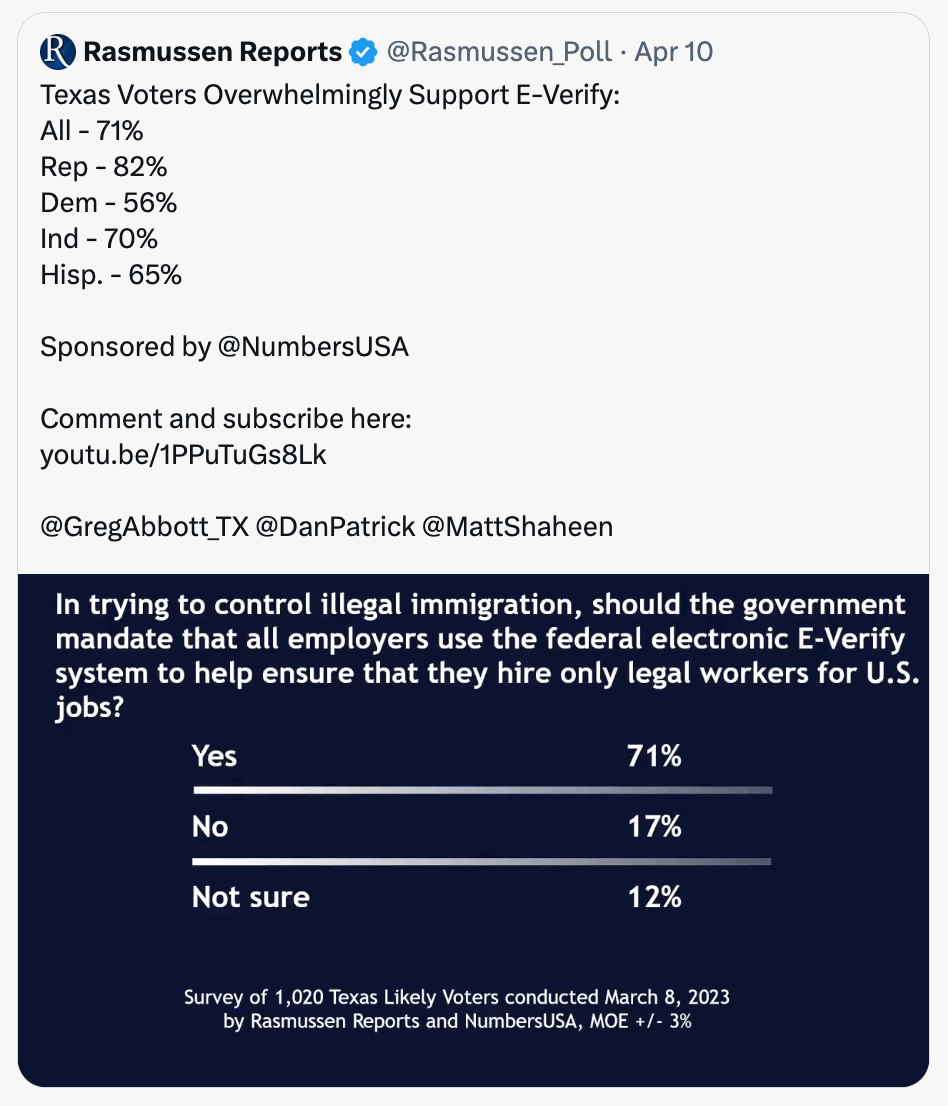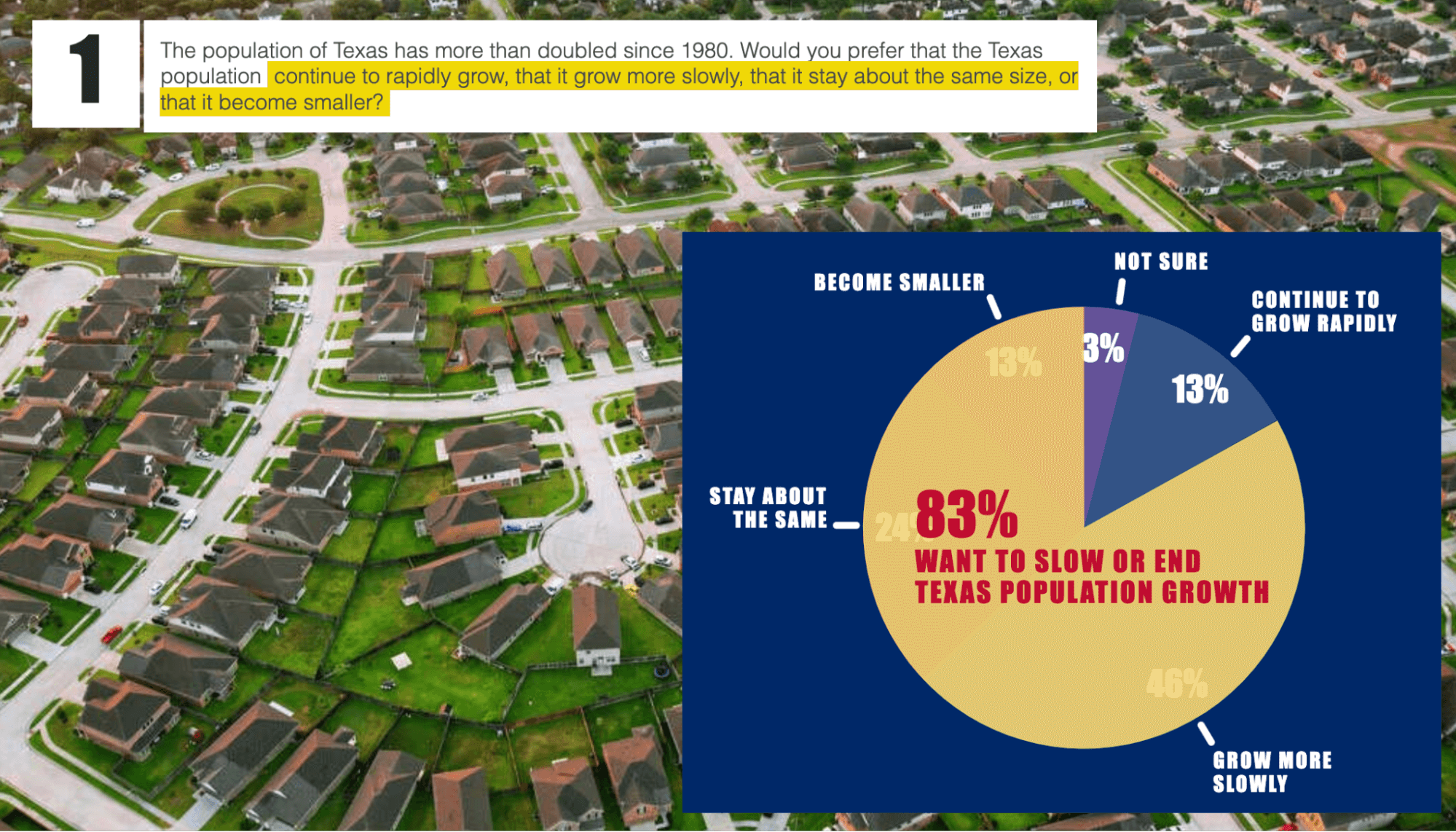
Bigger isn’t always better, not even in the great state of Texas, where a plurality of voters want to slow the pace of population growth and development to enjoy a better quality of life. Texas has been hit hard by the ongoing surge in illegal immigration. A strong majority of Texans – 57 percent – want to reduce immigration, and more than seven-out-of-ten want all employers to use E-Verify.
Those are some of the findings of a Rasmussen poll commissioned by NumbersUSA last month. According to Rasmussen:
There is strong consensus across party lines and demographic categories about many issues related to population growth in Texas. For example, 70% of Democrats, 65% of Republicans and 67% of independent voters believe it is Very Important to preserve Texas’ woodlands, natural wetlands, rivers, grasslands, and mountains. Seventy-four percent (74%) of whites, 59% of black voters, 65% of Hispanics and 83% of other minorities favor making E-Verify mandatory to help control illegal immigration.”
As you can see, E-Verify enjoys strong bi-partisan support. Among Texas voters who “strongly approve” of President Biden, 61 percent support mandatory E-Verify (with only 24% opposed).

Watch the video here.
That “strong consensus” isn’t reflected in Washington, D.C., however, where only ten of the 435 Representatives – and just one Democrat – have signed onto the bipartisan E-Verify bill, H.R. 319. Another bill, H.R. 2640, that would mandate E-Verify and discourage asylum fraud and human smuggling passed through the Judiciary late last night on a party-line vote. Fifteen out of 100 Senators – and no Democrats – have signed on to S. 156 in the Senate.
One Texas Senator (Cruz) and just two Representatives (Nehls; Carter) have signed on to the E-Verify bills.
Texans aren’t alone in being ignored by their elected officials. Go to your action board to contact yours.
|
Nine out of ten Texans say the state has become more crowded, and more than 80 percent would like Texas’ population growth to slow down or stop. A plurality (46%) favor restrictions on development to discourage people from moving in, while a majority (57%) favor reducing annual immigration.
See more results from our poll at www.TexasSprawl.com.

For over 20 years, NumbersUSA has been studying immigration policy’s impact on population growth and urban sprawl, including the loss of time, open space, and individual freedom.
Colorado study making news again

Leon Kolankiewicz, the scientific director of NumbersUSA, said the latest Colorado Sprawl Study shows the direct correlation between urban sprawl and the loss of open space, natural habitats, and agricultural lands.
“Wildlife is paying a heavy price for the human Juggernaut as it was.” Kolankiewicz said.
Kolankiewicz said the World Wildlife Fund conducted a study last year that found there’s about a 70% decline in wildlife around the world since 1970.
“This is basically humanity, replacing wildlife, humanity, and our stuff. It’s not just the number of human beings, it’s everything else that we have.” Kolankiewicz said.
The increase in populations state and countrywide is creating somewhat of a cyclical problem. An influx in population is seen as a way to boost the economy, but in turn you create a housing shortage and drive out wildlife from their natural habitats with urban development.
I discussed our Colorado study and poll on Uncommon Sense.
JEREMY BECK is a V.P., Deputy Director for NumbersUSA